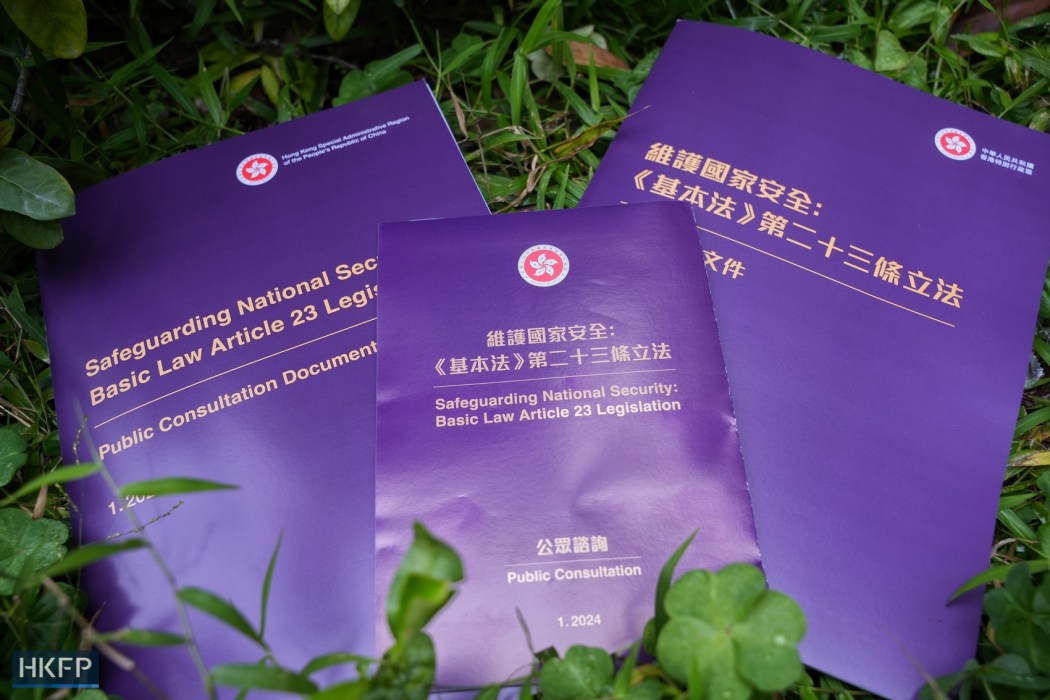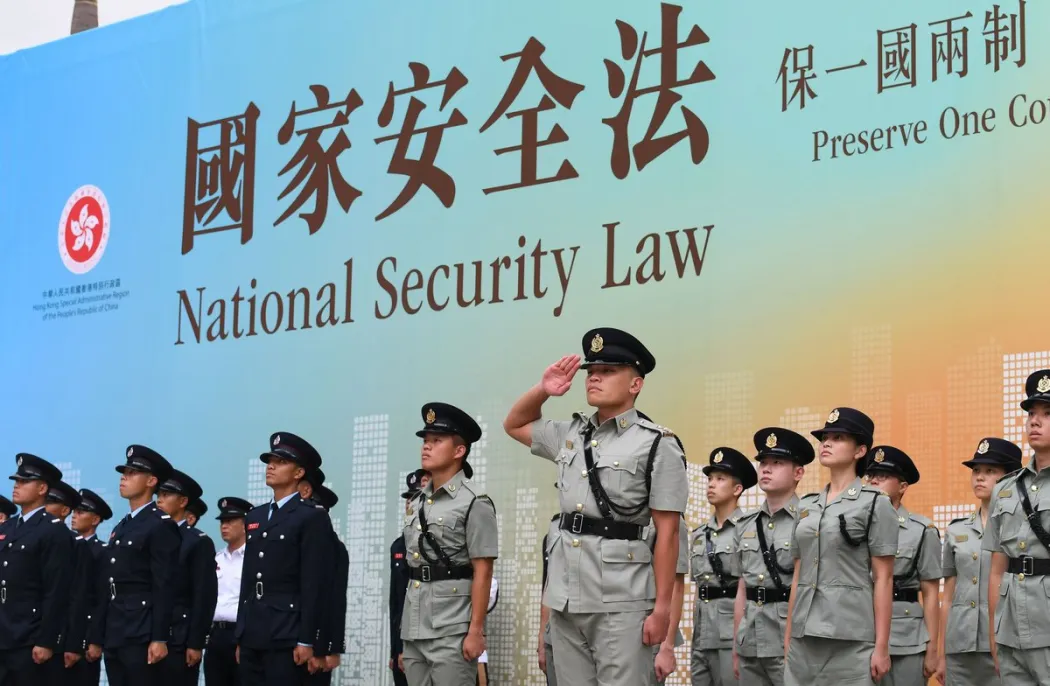A four-week public consultation for Hong Kong’s domestic security law began on Tuesday, after the first attempt to enact the controversial legislation required under Article 23 of the city’s mini-constitution failed following mass protests more than 20 years ago.

As the government proposed outlawing treason, insurrection, theft of state secrets and espionage, sabotage and external interference, HKFP rounds up reactions to the move.
Legislature
Representing Hong Kong’s opposition-free legislature, Legislative Council (LegCo) President Andrew Leung on Tuesday welcomed the public consultation period and said he was glad the security chief and the justice minister had explained the proposal to lawmakers at the earliest opportunity.

Laws safeguarding national security were not “unique” to Hong Kong and each country or region tailored its own legislation according to “specific requirements,” Leung said. The proposed enactment was “in line with international practices,” and a constitutional responsibility that Hong Kong had failed to fulfil since it was returned from British to Chinese rule, 26 years ago.
Both the legislators and I firmly believe that as long as the government, the Legislative Council, and the entire society unite, we will be able to successfully fulfil our constitutional responsibility to enact Article 23 legislation as soon as possible.
Andrew Leung, Legislative council
Democratic Party
In an online press conference held on Tuesday, the Democratic Party, one of the last remaining pro-democracy groups in Hong Kong, said the government should extend the public consultation period to three months. Party chairman Lo Kin-hei said in Cantonese the consultation paper was “rather complicated” and the general public may not grasp its content easily.

Lo raised concerns over the definition of state secrets, saying another core question was what the authorities considered as “national security” matters.
See also: Hong Kong’s homegrown security law seeks to define ‘state secrets’ along China’s legislative line
Explanation on the sedition offence was also needed to differentiate criminal behaviour from general criticism, the democrat said, especially after the government proposed raising the penalties for the offence of “seditious intention” and “possession of seditious publication.”
No one would deliberately breach national security. But many citizens may wonder if some media organisations do investigative reporting, which involves internal government information, would that be considered as something that may endanger national security?
Lo Kin-Hei, Democratic Party
Law Society
The Law Society of Hong Kong, which represents solicitors in the city, said on Tuesday that the group would carefully examine the details of the Article 23 proposal and submit any views it had to the government.

Chan Chak-ming, president of the Law Society, said it was Hong Kong’s constitutional duty to pass legislation under Article 23.
A proper balance should be struck between discharging the aforementioned constitutional duty on the one hand, and on the other hand giving due safeguards to the conduct of everyday lives of Hong Kong citizens and business activities, and the rights protected under the International Covenant on Civil and Political Rights and the International Covenant on Economic, Social and Cultural Rights.
Chan Chak-ming, the Law Society of hong kong
Amnesty International
Human rights NGO Amnesty International on Tuesday described Hong Kong as facing “potentially the most dangerous moment for human rights” since the Beijing-imposed national security law was enacted in June 2020. The enactment of domestic security legislation could “further entrench repression in the city,” the group’s China director Sarah Brooks said.

The NGO, which exited Hong Kong in 2021 citing operational concerns following the enactment of the national security law, accused authorities as using that legislation to “persecute” activists, politicians, journalists and civil society groups. The newly proposed law would likely proceed with “minimal meaning consultation” and no guarantee that it would comply with international law, Amnesty added.
The government has made clear it intends to double down on repression of civic freedoms under Article 23 by introducing steeper penalties and expanding cases in which the legitimate exercise of rights would be criminalised in the name of national security.
Amnesty International
Hong Kong Business Community
In a joint statement released on Tuesday, the Hong Kong General Chamber of Commerce, the Chinese Manufacturers’ Association of Hong Kong, the Federation of Hong Kong Industries and the Chinese General Chamber of Commerce said implementing Article 23 would provide a solid framework to protect national security and improve the overall business environment.

It was a general consensus that there was a need for the city’s homegrown security legislation, as investment sentiment in Hong Kong was “seriously hurt” by the 2019 unrest. The law would help “eliminate any unnecessary doubts,” the business groups said.
Enacting the relevant legislation without further delay will not only create a stable and trusted business environment, reignite investor confidence but, more importantly, allowing our business community to focus its energy on economic development and prosperity.
HKGCC, CMAHK, FHKI, CGCC
Article 23 of the Basic Law stipulates that the government shall enact laws on its own to prohibit acts of treason, secession, sedition and subversion against Beijing. Its legislation failed in 2003 following mass protests and it remained taboo until after the onset of the separate, Beijing-imposed security law in 2020. Pro-democracy advocates fear it could have a negative effect on civil liberties but the authorities say there is a constitutional duty to ratify it.
Support HKFP | Policies & Ethics | Error/typo? | Contact Us | Newsletter | Transparency & Annual Report | Apps
Help safeguard press freedom & keep HKFP free for all readers by supporting our team
























